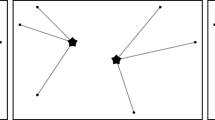Abstract
A hybridisation of a clustering-based technique and of a variable neighbourhood search (VNS) is designed to solve large-scale \(p\)-median problems. The approach is based on a multi-stage methodology where learning from previous stages is taken into account when tackling the next stage. Each stage is made up of several subproblems that are solved by a fast procedure to produce good feasible solutions. Within each stage, the solutions returned are put together to make up a new promising subset of potential facilities. This augmented \(p\)-median problem is then solved by VNS. As these problems used aggregation, a cost evaluation based on the original demand points instead of aggregation is computed for each of the ‘aggregation’-based solution. The one yielding the least cost is then selected and its chosen facilities included into the next stages. This multi-stage process is repeated several times until a certain criterion is met. This approach is enhanced by an efficient way to aggregate the data and a neighbourhood reduction scheme when allocating demand points to their nearest facilities. The proposed approach is tested, using various values of \(p\), on the largest data sets from the literature with up to 89,600 demand points with encouraging results.






Similar content being viewed by others
References
Avella, P., Boccia, M., Salerno, S., Vasilyev, I.: An aggregation heuristic for large scale \(p\)-median problem. Comput. Oper. Res. 39(7), 1625–1632 (2012)
Casillas, P.: Aggregation problems in location–allocation modeling. In: Gosh, A., Rushton, G. (eds.) Spatial Analysis and Location–Allocation Models, pp. 327–344. Van Nostrand Reinhold, New York (1987)
Current, J.R., Schilling, D.A.: Elimination of source A and B errors in \(p\)-median location problems. Geogr. Anal. 19, 95–110 (1987)
Dongarra, J. J.: Performance of various computers using standard linear Equation software. http://www.netlib.org/benchmark/performance.pdf (Accessed online 15 April 2013)
Erkut, E., Bozkaya, B.: Analysis of aggregation errors for the \(p\)-median problem. Comput. Oper. Res. 26, 1075–1096 (1999)
Francis, R.L., Lowe, T.J., Rayco, M.B.: Row-column aggregation for rectilinear distance \(p\)-median problems. Transp. Sci. 30, 160–174 (1996)
Francis, R.L., Lowe, T.J., Rayco, M.B., Tamir, A.: Aggregation error for location models: survey and analysis. Ann. Oper. Res. 167, 171–208 (2009)
Garcia, S., Labbe, M., Marin, A.: Solving large \(p\)-median problem with a radius formulation. Inf. J. Comput. 23, 546–556 (2010)
Hansen, P., Brimberg, J., Urosevic, D., Mladenovic, N.: Solving large \(p\)-median clustering problems by primal-dual variable neighborhood search. Data Min. Knowl. Discov. 19, 351–375 (2009)
Hansen, P., Mladenovic, N.: Variable neighbourhood search for the \(p\)-median. Locat. Sci. 5, 207–225 (1997)
Hillsman, E.L., Rhoda, R.: Errors in measuring distances from populations to service centers. Ann. Reg. Sci. 12, 74–88 (1978)
Hodgson, M.J.: Data surrogation error in \(p\)-median models. Ann. Oper. Res. 110, 153–165 (2002)
Hodgson, M.J., Neuman, S.: A GIS approach to eliminating source C aggregation error in \(p\)-median models. Locat. Sci. 1, 155–170 (1993)
Hodgson, M.J., Shmulevitz, F., Körkel, M.: Aggregation error effects on the discrete-space \(p\)-median model: the case of Edmonton. Can. Can. Geogr. 41, 415–428 (1997)
Papadimitriou, C.H.: Worst-case and probabilistic analysis of a geometric location problem. SIAM J. Comput. 10, 542–557 (1981)
Qi, L., Shen, Z.M.: Worst-case analysis of demand point aggregation for the Euclidean \(p\)-median problem. Eur. J. Oper. Res. 202, 434–443 (2010)
ReVelle, C.S., Swain, R.: Central facilities location. Geogr. Anal. 2, 30–42 (1970)
Salhi, S., Gamal, M.D.H.: A genetic algorithm based approach for the uncapacitated continuous location–allocation problem. Ann. Oper. Res. 123, 203–222 (2003)
Whitaker, R.A.: A fast algorithm for the greedy interchange for large-scale clustering and median location problems. Infor 21, 95–108 (1983)
Zoubi, M.B., Rawi, M.: An efficient approach for computing silhouette coefficients. J. Comput. Sci. 4, 252–255 (2008)
Acknowledgments
The authors would like to thank both referees for their useful suggestions that improved both the content as well as the presentation of the paper. This research has been partially supported by the Ministry of Science and Innovation of Spain under the research project ECO2011-24927, in part financed by the European Regional Development Fund (ERDF), and the Fundacion Seneca under the research project 15254/PI/10, and also by the Algerian Ministry of Education (Sciences Fundamentals), under research project PNR 8/U160/64.
Author information
Authors and Affiliations
Corresponding author
Rights and permissions
About this article
Cite this article
Irawan, C.A., Salhi, S. Solving large \(p\)-median problems by a multistage hybrid approach using demand points aggregation and variable neighbourhood search. J Glob Optim 63, 537–554 (2015). https://doi.org/10.1007/s10898-013-0080-z
Received:
Accepted:
Published:
Issue Date:
DOI: https://doi.org/10.1007/s10898-013-0080-z




